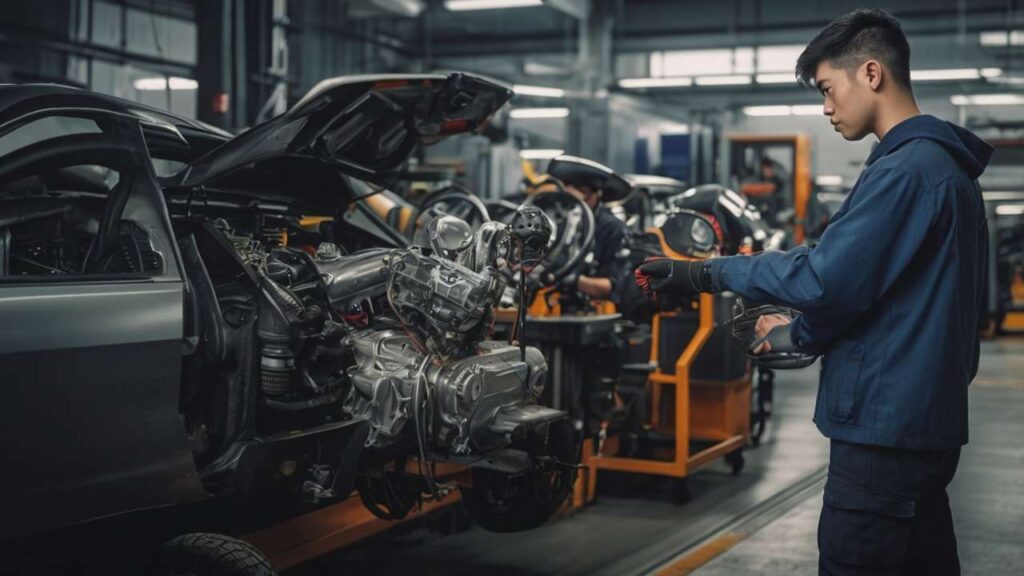I’ll be honest here—brake repair is one of those things that looks deceptively simple on YouTube. Pads out, new pads in, tighten a few bolts, and you’re good to go… right? But ask any trusted brake specialist in North Carolina and they’ll tell you the same thing: it’s never just about the pads. The brake system is the single most important safety feature of your vehicle, and cutting corners to save a few bucks can cost you far more—in money, in stress, and potentially in safety.
I’ve seen this mistake more times than I’d like to admit. A neighbor once tried to replace his own brake pads using a cheap jack and a $30 toolkit. Two weeks later, he came knocking at my door asking for a ride to the shop—his brakes had started grinding metal-on-metal because he hadn’t checked the rotors. That “DIY win” ended up costing him triple what a professional service would have charged in the first place. This is exactly why DIY vs. Pro in brake repair isn’t really a fair fight—the experts win every time.
For anyone tempted to skip the shop, let’s break down why professional, trusted, and reliable brake repair services in North Carolina are the smartest and safest choice.
The Real Safety Risks Behind DIY Brake Repair
The biggest issue with DIY brake repair isn’t money—it’s safety. Brakes aren’t like a dead battery you can jumpstart or a flat tire you can patch. If you misalign a caliper, under-torque a bolt, or fail to bleed the system properly, your stopping distance increases dramatically. That might mean the difference between a safe stop at a Raleigh intersection and rear-ending someone on I-40.
As one brake repair expert told me: “People underestimate how precise brakes have to be. Even a minor mistake can compromise the entire system.”
And here’s the thing—brake failure doesn’t give you a polite warning. Sure, you might hear squealing or grinding, but sometimes the first sign is that terrifying moment when you press the pedal, and nothing happens. That’s not a chance worth taking.
Articles like The Early Warning Signs of Brake Trouble: Don’t Wait for the Grinding Noise go into depth about what happens if you ignore the signs. Spoiler alert: waiting only makes the risk higher and the repair bill larger.
Why Specialized Tools Make All the Difference
Most DIY kits are laughably basic compared to the tools professionals use. A few of the essentials that separate pros from hobbyists include:
- Torque Wrenches – Without precise torque, bolts can either be too loose (causing dangerous vibration) or too tight (stripping threads). Professionals know the exact specs for each make and model.
- Brake Bleeding Kits – Air bubbles in brake lines can make your pedal feel “spongy” and reduce stopping power. Bleeding requires proper tools to ensure hydraulic pressure is correct.
- Caliper Compressors – Trying to force caliper pistons back with pliers is a common DIY mistake. A compressor ensures the pistons retract evenly, preventing uneven pad wear.
These tools aren’t just expensive—they require training and experience to use correctly. As much as we love rolling up our sleeves, the fact is that brake repair is not just a matter of having the right tools, but knowing exactly what to do with them.
A Professional Service Isn’t Just Pads and Rotors
Another major difference between DIY and pro brake repair is the scope of inspection. A DIYer might swap pads and call it a day, but a trusted brake service in North Carolina includes:
- Checking rotor thickness and resurfacing or replacement if needed.
- Inspecting calipers for leaks or sticking pistons.
- Examining brake lines for cracks or corrosion.
- Testing brake fluid quality and replacing it if it’s contaminated.
As explained in Brake Fluid 101: The Unsung Hero of Your Vehicle’s Stopping Power, old or contaminated fluid can silently compromise your entire system. Professional mechanics know this, which is why a complete brake service is always more than a quick parts swap.
This full-system approach is also detailed in What to Expect from a Professional Brake Inspection in North Carolina, showing how inspections go far beyond surface-level fixes.
Liability, Expertise, and Peace of Mind
Let’s not overlook the comfort of knowing an expert handled your repair. DIY doesn’t come with a warranty. If your brakes fail after you worked on them, the liability is entirely yours. On the other hand, a reliable, professional brake shop provides a warranty on both parts and labor. That’s not just protection for your wallet—it’s peace of mind every time you get behind the wheel.
I once read a case study from a Greensboro driver who admitted he trusted a “backyard mechanic” for a brake job. Within three months, the lines leaked, and he nearly lost control on a steep hill. After switching to certified professionals, he said the difference wasn’t just the car’s performance—it was the confidence he felt driving his family again. That confidence is priceless.
Beyond the Obvious: Costs, Delays, and Real Consequences
A lot of drivers think DIY brake repair saves money, but consider the hidden costs. If you miss early signs, like warped rotors or uneven wear, the damage snowballs. As covered in The Cost of Waiting: How Ignoring Brake Issues Can Empty Your Wallet, delaying repairs can mean replacing not just pads, but rotors, calipers, and even ABS components.
And if you’re curious about the differences between setups, Disc Brakes vs. Drum Brakes: Understanding Your Vehicle’s Braking System explains why each type has unique repair needs. Many DIYers don’t even realize their vehicle might need a different approach depending on the system.
Looking Ahead: Future Topics to Watch For
As vehicle technology evolves, brake repair knowledge must evolve with it. We’ll soon be expanding into more advanced topics, like how hybrid and electric vehicles handle regenerative braking, or how smart brake monitoring systems are changing inspections. There’s also growing interest in eco-friendly brake pad materials that reduce dust and pollution. These future discussions will build on the foundation of today’s core advice: trust professionals, because the brake system isn’t a place for trial and error.
For those curious, the best place to start learning more is our hub for Top-Quality Brake Services Experts in North Carolina, where trusted specialists explain their process in detail.
FAQs
1. Is DIY brake repair ever safe?
For very experienced DIYers with full professional tools, maybe. But for the average driver, it’s risky and often more expensive in the long run.
2. How often should brakes be inspected in North Carolina?
Most experts recommend at least once a year, or every 12,000 miles. But if you notice squealing, vibration, or longer stopping distances, don’t wait.
3. Why do professionals replace brake fluid when I thought only pads needed changing?
Because fluid degrades over time, absorbing moisture and reducing hydraulic efficiency. It’s as critical as the pads themselves.
Final Thoughts: Don’t Gamble with Brakes
So, DIY vs. Pro: Why brake repair is best left to North Carolina’s experts? The answer is clear. Brakes aren’t just another part of your vehicle—they are your lifeline in every drive. Professional brake services bring specialized tools, expert inspections, warranties, and above all, peace of mind. Saving a few dollars with a risky DIY job isn’t worth the danger or the potential long-term costs.
If you found this article useful, please hit the share buttons below and spread the word. Someone you know might be one DIY attempt away from a serious accident—and your share could steer them toward safer, smarter, and more professional brake repair.


